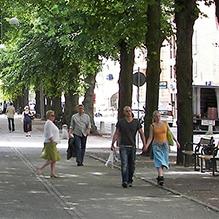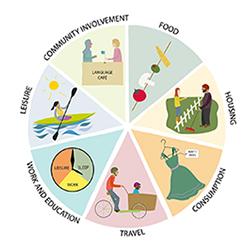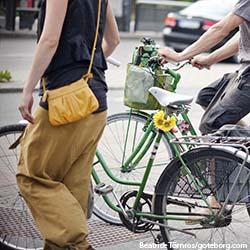Sustainable Lifestyles - Tools and Methods
To say that we need to adopt more sustainable lifestyles is something increasingly more can agree on. Our lifestyles are contributing causes of problems such as pollution and climate change, illness and segragation. There is also a large inequality in the different lifestyles people around the world have and the way they effect their surroundings. To lower the negative effects on the climate and realise a more just distribution of pollution between people in differents parts of the world, lifestyle changes are nessecary. The project has throughout the first year worked on trying to shed some light on what sustainable lifestyles entail and how to support this movement, both on a local and a regional level in the Västra Götaland region.
There is still no universal definiton of the term ‘sustainable lifestyles’ in litterature and science. The similarities seen in the definitions of the term used today are that consumption and quality of life, health and well-being as well as a shared responsibility are being emphazised as being key components. The project views the term this way:
A sustainable lifestyle incorporates what we do, have, use and show, how we view the world and what our values are. A sustainable lifestyle refers to a change towards sustainable urban development (environmental, social and economical), along with an increased quality of life for the individual and the rest of the world. The term sustainable lifestyles is about: the choices and actions of the individual in combination with the preconditions and context that aids sustainable living. Finally, the term means that individuals feel solidarity with and towards other people, other lives and future generations.
The local power and competence
Local and regional public stakeholders, such as municipalities, county adminsitrative boards and regions have a lot of resources when it comes to matters regarding lifestyles. The problem is that the local governance instruments and tools are not always clear and are not being used. The challenge is to make it visible for stakeholders in what way their actions can enable or prevent sustainable lifestyles, and dare to speak about one lifestyle being more sustainable than another.
To clarify what the local/regional level can do we have gathered examples of tools and methods from the different parts of the lifestyle wheel on www.hallbaralivsstilar.se.
10YFP Programme on Sustainable Lifestyles and Education
The 10YFP Programme on Sustainable Lifestyles and Education (http://www.unep.org/10yfp/) was launched at the UNESCO World Conference in November 2014. The programme is co-led by the Ministry of Environment of Japan, the Government of Sweden represented by the Stockholm Environment Institute (SEI) and the World Wide Fund for Nature (WWF). By participating in this UN Programme, the project will exchange knowledge and experiences on how to stimulate sustainable lifestyles locally and regionally with other actors in Sweden and the rest of the world.
Erica Eneqvist, project manager, presents Sustainable Lifestyles at a workshop in Hammarkullen 4 February 2016.







